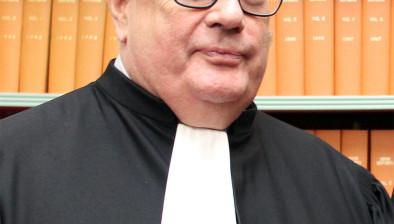High Court: Judge orders remote hearing under new law despite objections from defendant

Killian Flood BL
The High Court has ruled that a Commercial Court case will be heard using the remote hearing platform TrialView, despite objections from the defendant.

About this case:
- Citation:[2021] IEHC 83
- Judgment:
- Court:High Court
- Judge:Mr Justice Brian O'Moore
The court considered the provisions of the Civil Law and Criminal Law (Miscellaneous Provisions) Act 2020, which allows a court of its own motion to order a remote hearing, and said that it was appropriate to make the order in the case.
The case had been listed to start in January in a partially-remote hearing, with some witnesses and lawyers being present in court. However, the recent coronavirus regulations prevented this.
Giving the decision, Mr Justice Brian O’Moore ruled that there was no prejudice to any party in conducting examinations of witnesses remotely and that limited resources had already been allocated for a six-week trial before the recent restrictions. The judge also said that he was fully satisfied that he could properly assess witnesses using the TrialView platform.
TrialView is a cloud-based document and video sharing platform designed specifically for court hearings. It has been used in several high-profile cases since the beginning of the coronavirus pandemic.
Background
The ruling concerned a case in which the special liquidators of the Irish Bank Resolution Corporation were seeking to recover sums of £11,964,478, under one facility and €13,539,286, £2,093,311 and $990,992 under a second facility from Mr Thomas Browne. Mr Browne was a former director of Anglo-Irish Bank and oversaw substantial lending up until November 2007. He defended the proceedings claiming that he was entitled to rescind the loan agreements due to fraud by IBRC. Mr Browne also brought a counterclaim for damages against the plaintiff.
The proceedings issued in the Commercial List in 2010 but owing to disagreements relating to discovery and the criminal investigations into other former Anglo directors, no trial took place and the matter was adjourned generally. The case was eventually given a trial date in January 2021 and was expected to run for six weeks.
Following the implementation of the Level 5 restrictions in December, the trial could no longer proceed with in-person advocacy and witness examination as planned. As such, the parties made submissions on having a fully remote hearing.
Mr Browne objected to a remote hearing in the case, citing several related reasons. First, it was said to be necessary for Mr Browne to give his evidence in person because the court could not assess his credibility via video link. It was claimed that it would be difficult for Mr Browne’s legal team to liaise with one another for a remote hearing. Further, Mr Browne argued that only urgent cases were supposed to proceed under the President’s High Court Notice for Level 5 restrictions, and his case was not urgent. Finally, it was said that Mr Browne did not have confidence in the process, which was an important factor.
Counsel for IBRC also claimed that it was preferable for Mr Browne and another key witness to give evidence in person.
High Court judgment
The court rejected all of the defendant’s arguments and ordered a remote hearing in the case. Considering section 11(2) of the 2020 Act, the court ruled that it could order a remote hearing of its own motion rather than by request of the parties. Mr Justice O’Moore outlined some of the factors which informed his decision, including that the Commercial List was a managed list where the court takes an active role in the proceedings. Moreover, it was noted that six weeks had been set aside for the trial, which was a substantial amount of court resources during the pandemic. Finally, the case had a “lengthy and chequered history” and it was important to bring it to a resolution.
Further, the court held that section 11(4) of the Act required that a direction for a remote hearing must be revoked if it would result in unfairness to any party. As such, the court identified the relevant test as 1) whether either party would be unfairly treated by a remote hearing and 2) whether the court should exercise its wide discretion to order a remote hearing.
Applying the test to the case, the court held that a remote hearing would not be unfair to Mr Browne. In reaching this decision, the court noted that the parties had in fact agreed that a number of witnesses, including experts, would be examined remotely before the recent Level 5 restrictions. As such, there was no good reason advanced why Mr Browne could not do the same.
Further, Mr Justice O’Moore held that, based on his experience, “the TrialView platform is one which enables me to assess the evidence.” The court also cited praise of the platform by Mr Justice Denis McDonald in Leinster Overview & Ors. v. FBD Insurance [2021] IEHC 78 who said that the system was “perfectly adequate from a judge’s perspective in terms of being able to see the face of the witness clearly as the witness is being examined by counsel.” The court also noted the approval of Mr Justice David Barniville and Mr Justice Charles Meenan of the TrialView system.
Conclusion
The judge concluded that there was “no real substance” to the objections of Mr Browne. Parties could make arrangement such as Whatsapp groups for easy communication. Further, the defendant was simply wrong to say that only urgent matters could take place under the High Court Notice. As such, the court directed that the action would be heard remotely using the TrialView platform.









